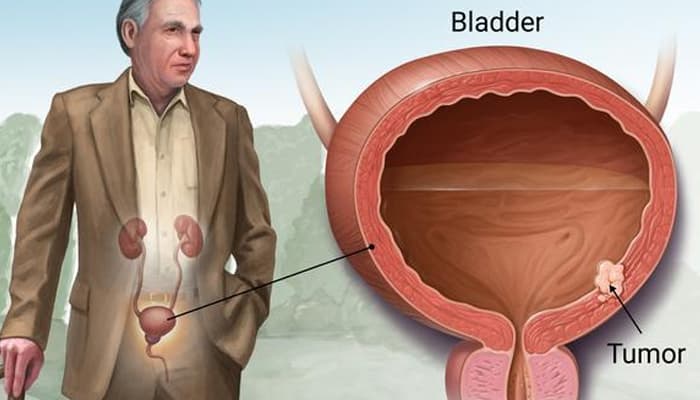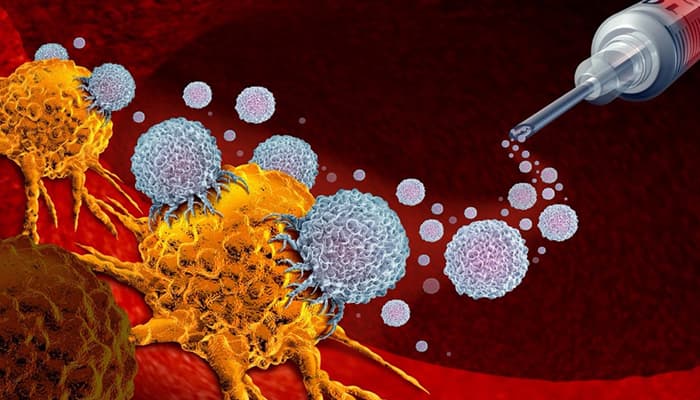When you are diagnosed with bladder cancer, there are many treatment options available to help you manage it. Each treatment protocol is likely to vary from patient to patient, and from cancer to cancer.
Many parameters influence the treatment options available: type of cancer, the aggressiveness of the tumor, stage of development, profile and wishes of the patient, etc.
Among the therapeutic weapons that can be used in the treatment of bladder cancer, we typically find surgery, immunotherapy, chemotherapy and radiotherapy.
What is bladder cancer?

Bladder cancer is a malignant tumor that arises from the cells that make up the bladder. A malignant tumor is a collection of cells that begin to grow abnormally and uncontrollably. There are many different types of bladder cancer, but the most common is urothelial carcinoma (90% of bladder cancer cases).
Depending on its stage of development at the time of diagnosis, urothelial carcinoma is classified as invasive or “infiltrating the bladder muscle” ( TVIM ) or non-infiltrating “non-infiltrating the bladder muscle” ( TVNIM ). When it is invasive, it has invaded different tissues of the urinary tract. Non-invasive, it is limited to the urothelium, the internal wall of the bladder.
The invasive or non-invasive nature of bladder cancer at the time of diagnosis is a decisive criterion in the development of its treatment protocol. However, it is not the only parameter to take into account, far from it.
The appropriate treatment for each bladder cancer is always determined on a case-by-case basis by a multidisciplinary medical team.
The development of the treatment protocol is based both on the effectiveness of the therapies envisaged on the type of tumor encountered and on the potential impacts of the treatment on the patient’s quality of life about their comorbidities and their functional index.
Depending on these different elements, treatment for bladder cancer may include chemotherapy, surgery, immunotherapy, and radiotherapy. These treatments can be administered alone or in synergy.
Surgery in the treatment of bladder cancer

Surgery is usually the standard treatment for bladder cancer, especially when it is non-invasive, i.e. still localized to well-defined tissues. Surgical intervention may consist of transurethral resection of the tumor and/or cystectomy.
Transurethral resection is a conservative surgery, which consists of removing the cancerous tumor while preserving as much healthy tissue as possible to preserve the bladder. It is called a “transurethral” procedure because the surgical operation is performed through the urethra. The operation is therefore less abrasive, healing is faster and the risks of complications are lower.
Cystectomy, on the other hand, consists of a partial or complete removal of the bladder. It is usually preferred when the cancer is invasive and/or presents a significant risk of recurrence. In the case of invasive cancer, cystectomy may be combined with pelvic lymph node dissection, which consists of removing the lymph nodes to analyze them in the laboratory and assess their degree of invasion, revealing the stage of development of the cancer.
Immunotherapy in the treatment of bladder cancer

Immunotherapy is commonly administered as part of the management of bladder cancer. This innovative treatment aims to support and/or reactivate the immune system’s response, to eliminate cancer cells.
The body’s immune system does have the ability to destroy cancer cells. The reason the body usually fails to defend itself against cancer is largely due to the ability of cancer cells to mutate to trick the body and thwart the immune response.
There are different types of immunotherapy. Intravesical immunotherapy ( BCG therapy ) is often used to treat bladder cancer, in which the treatment is injected directly into the bladder. Used in addition to transurethral resection, this type of immunotherapy can eliminate low- or moderate-risk non-invasive tumors or provide long-term control of the disease.
In cases of advanced disease or metastatic recurrence, systemic immunotherapy may be proposed. This allows the immune system to be reactivated against cancer cells that “disguise” themselves as healthy cells so as not to be attacked.
Chemotherapy in the treatment of bladder cancer

In the context of TVIM, chemotherapy is often proposed in a neoadjuvant situation, that is, before surgery. Its objective is to regress the tumor and/or locoregional lymph nodes to make surgery easier and reduce the risk of relapse.
Chemotherapy is sometimes used to treat advanced and metastatic bladder cancer. This drug treatment is composed of a cocktail of antitumor substances that destroy cancer cells. By circulating throughout the body, chemotherapy can reach cancer cells that are scattered and impossible to locate, unlike local treatments such as surgery and radiation therapy, which only work in targeted areas.
In localized forms (TVNIM), it can be administered after transurethral resection, intravesically (directly into the bladder using a probe) to limit the risks of local recurrence.
In locally advanced forms, in case of refusal or contraindication to surgery, chemotherapy can be combined with radiotherapy, because these two treatments tend to reinforce each other’s effects.
Radiotherapy in the treatment of bladder cancer

Radiotherapy can be an integral part of bladder cancer management, often in combination with chemotherapy. Radiotherapy may also be used when surgery is not possible. This local treatment involves irradiating cancer cells with high-energy rays that damage the cancer cells’ DNA to destroy them and/or prevent them from continuing to multiply.
Radiotherapy may be given to achieve a complete cure (curative radiotherapy) or to improve the patient’s quality of life, slow the progression of the disease and/or prolong longevity (palliative radiotherapy).
Nowadays, radiotherapy is delivered in an intensity-modulated conformal manner. This technique allows for better sparing of neighboring healthy organs to limit potential side effects.
There are many possible therapies for treating bladder cancer, and the available options are only expanding as cancer medicine advances.
Immunotherapy, which has seen great advances in recent years, could in particular change the situation by providing new, more effective, and less aggressive alternatives.
